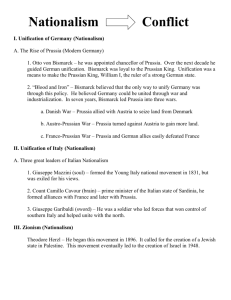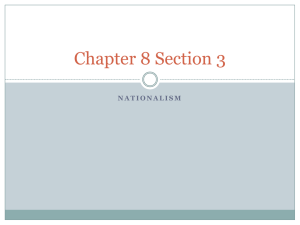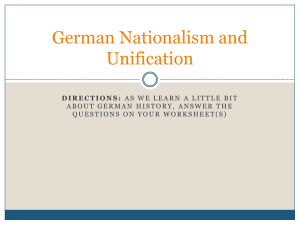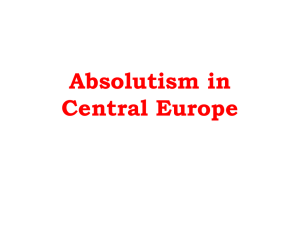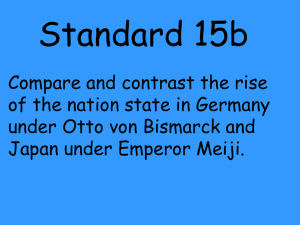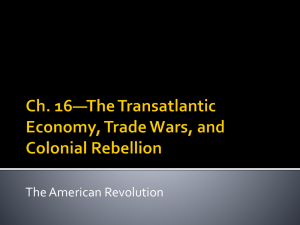Unification of Germany Essays
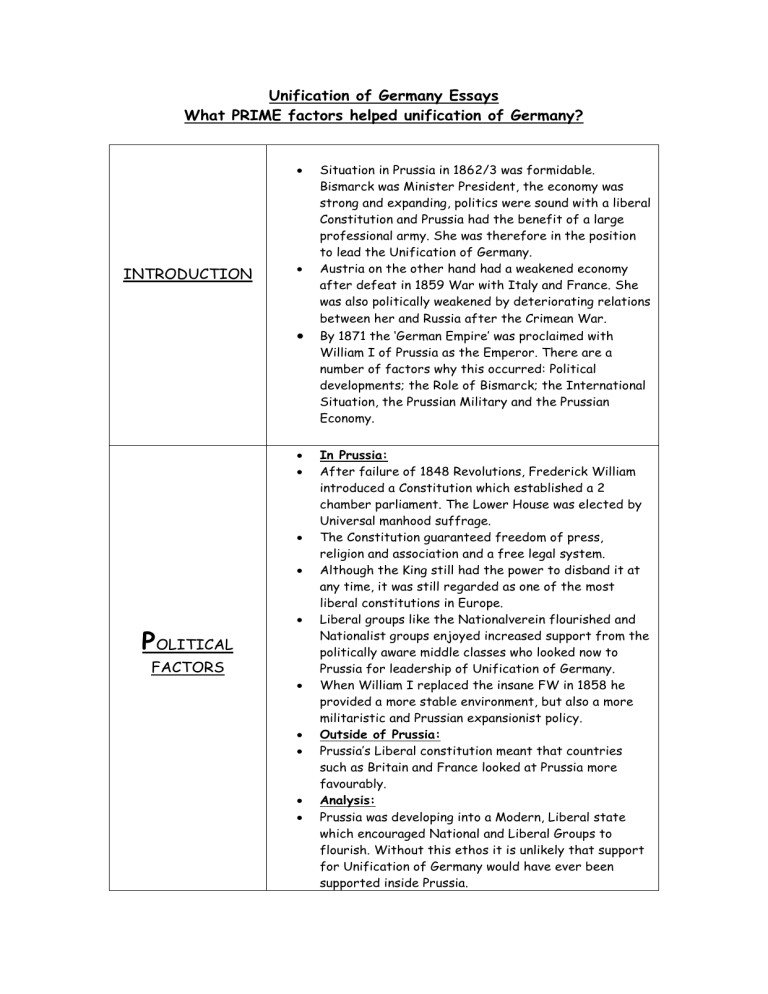
INTRODUCTION
Unification of Germany Essays
What PRIME factors helped unification of Germany?
Situation in Prussia in 1862/3 was formidable.
Bismarck was Minister President, the economy was strong and expanding, politics were sound with a liberal
Constitution and Prussia had the benefit of a large professional army. She was therefore in the position to lead the Unification of Germany.
Austria on the other hand had a weakened economy after defeat in 1859 War with Italy and France. She was also politically weakened by deteriorating relations between her and Russia after the Crimean War.
By 1871 the ‘German Empire’ was proclaimed with
William I of Prussia as the Emperor. There are a number of factors why this occurred: Political developments; the Role of Bismarck; the International
Situation, the Prussian Military and the Prussian
Economy.
P
OLITICAL
FACTORS
In Prussia:
After failure of 1848 Revolutions, Frederick William introduced a Constitution which established a 2 chamber parliament. The Lower House was elected by
Universal manhood suffrage.
The Constitution guaranteed freedom of press, religion and association and a free legal system.
Although the King still had the power to disband it at any time, it was still regarded as one of the most liberal constitutions in Europe.
Liberal groups like the Nationalverein flourished and
Nationalist groups enjoyed increased support from the politically aware middle classes who looked now to
Prussia for leadership of Unification of Germany.
When William I replaced the insane FW in 1858 he provided a more stable environment, but also a more militaristic and Prussian expansionist policy.
Outside of Prussia:
Prussia’s Liberal constitution meant that countries such as Britain and France looked at Prussia more favourably.
Analysis:
Prussia was developing into a Modern, Liberal state which encouraged National and Liberal Groups to flourish. Without this ethos it is unlikely that support for Unification of Germany would have ever been supported inside Prussia.
R
OLE OF
BISMARCK
Bismarck later stated he planned Unification of
Germany in 5 steps: 1. Obtaining Russian neutrality; 2.
Tricking Austria into declaring War; 3. Obtaining
French neutrality; 4. Treating Austria leniently after defeat and 5. Tricking France into declaring War.
Whether he was a ‘Master Planner or Lucky
Opportunist’ his diplomacy led to the same result:
Unification of Germany.
Initially he was responsible for persuading Austria to join Prussia in War against Denmark which allowed
Prussia to eventually gain both Schleswig and Holstein.
Later he was responsible for meeting with Napoleon at
Biarritz to try and gain neutrality.
Once the Austro-Prussian War ended in Austria’s defeat, he alone was responsible for consolidating gains made in the Treaty of Prague in 1866. William I and Von Moltke wanted to advance to Vienna. This meant that the North German Confederation was established under Prussian control.
He was also important in establishing the secret military agreements and creating the Zollparlament with the Southern states that ultimately led to full unification once France started the War in 1870.
He was finally instrumental in the build up to the
Franco-Prussian War of 1870-71. He annoyed Napoleon by changing his mind over the Luxembourg situation; he manipulated the Hohenzollern Candidature Crisis and by changing the meaning of the Ems Telegram he was directly responsible for France declaring War.
Analysis:
Bismarck was instrumental in uniting Germany. He was a skilled diplomat who was at first a Prussian expansionist who later became a German statesman.
He was willing to take chances and use opportunities when they were presented to him. Without him, it is unlikely that Germany would have unified when she did.
I
NTERNATIONAL
SITUATION
Russia and Austria:
Russia was upset at Austria for their lack of support during the Crimean War which ultimately led to the end of the Holy Alliance.
Although Russia was upset when Bismarck played down
Alvensleben Convention, she was ultimately more annoyed at Austria which kept her neutral in the ensuing war.
M
ILITARY
FACTORS
(PRUSSIAN)
INTERNATIONAL
SITUATION continued…
Britain:
Was now pleased with ‘liberal Prussia’ and no longer concerned with intervening in European diplomacy. She regarded France and Russia as the larger threats to security and peace. She didn’t mind whether Austria or Prussia was the strong central power that counterbalanced both France and Russia on either side.
France:
Napoleon enjoyed his role as diplomatic negotiator between Italy, Prussia and Austria. Napoleon was quite willing to remain neutral in the Austro-Prussian War after his meeting with Bismarck at Biarritz. However, his secret negotiations with Austria shows he was quite willing to be swayed as long as the result benefited him.
Unfortunately this finally backfired when there was no one left to support him during the Franco-Prussian
War which led to his defeat and capture.
Analysis:
The International Situation benefited Prussia greatly.
Without Russia and Britain (and France initially) staying neutral Prussia is unlikely to have defeated
Austria. With Austria defeated there was no country left that was willing to support France. This allowed
Prussia to pick off her enemies one by one.
1860-62:
New Minister for War: General von Roon called for an
Army Bill to increase conscription from 2 to 3 years; double the size of the army and get rid of influence of
Civilian Militia. This led to the Constitutional crisis which brought Bismarck into power. He simply forced through the army bill which led to a strong, modern and professional army.
During the Industrial revolution railway lines had increased which was later to impact on mobilisation of troops. Also entrepreneurs like Alfred Krupp had developed advanced technology that had a direct impact on the Prussian Army. His breech-loading needle gun had a great effect particularly against the
French.
Austro-Prussian War 1866:
Austria was forced into mobilising troops first as she knew Prussia could mobilise quickly and therefore was seen as the aggressor.
The Battle of Konningratz (Sadowa) on the 3 rd July
1866 was remarkable considering the Austrian army outnumbered Prussia by 400,000 – 300,000.
MILITARY
FACTORS continued….
E
CONOMIC
FACTORS
(PRUSSIAN)
However, the Prussian railway lines outnumbered
Austria by 5 to 1.
Von Moltke’s tactics of splitting the troops up to gain maximum speed cut off the Austrian northern army from their southern army which directly led to
Austria’s defeat.
Franco-Prussian War 1870-71:
Again Prussia’s railway lines outnumbered the French 6 to 2 which allowed her to mobilise quickly.
With Krupp’s effective breech-loading needle gun, the
Prussian army quickly gained the upper hand.
The French were forced to withdraw to the fortified town of Metz.
Again von Moltke’s tactics led to defeat as he cut off
Metz from the rest of their army leading to 180,000 soldiers surrendering.
On the 2 nd September 1870 the Prussian army easily defeated the rest of the French Army in the Battle of
Sedan Hill.
From there von Moltke pushed on and in a humiliating move captured Paris on the 18 th January 1871 where
Napoleon was captured and the French Government announced the new united Germany under Prussian control.
Analysis:
Without the railway lines the Prussian Army would not have been so effective in mobilising so quickly. But undoubtedly without von Moltke’s superb modern tactics the Prussian Army would have struggled.
Prussia’s Industrial revolution in the 1850s was instrumental in allowing Prussia to modernise and become a major European Power.
Raw materials in the Saar, the Ruhr and Upper Silesia increased to leave Prussia self-sufficient.
Exports and foreign trade doubled and a new, modern
Banking system was established.
Entrepreneurs flocked to Prussia and technological developments like Krupp’s breech-loading needle gun would have a great importance for the future of the
Prussian Army.
The most important development was the Railway lines which increased from 3,280km in 1845 to 11,633km in
1860. This not only helped trade but helped the army mobilise her troops quickly against Austria and France.
Whilst Austria was in decline economically and militarily backwards, Prussia was modernising and expanding. Prussia had a bigger grain harvest than
Austria, produced 3x as much coal, had 8x as much
ECONOMIC
FACTORS continued….
CONCLUSION
steam engine power and this was despite the fact
Austria was double Prussia’s size in territory and population.
Analysis:
Without the developments of technology that would help the Prussian army like Krupp’s needle gun; without the modern economic developments that could finance
War and without the developments of the railway lines it seems very unlikely that the Prussian army would have defeated either Austria or Prussia.
Economic and Political developments in Prussia in the
1850s were vitally important in creating a modern, strong and powerful European power.
Railway and army technological developments at this time were critical in allowing the Army to succeed against both Austria and France.
The International situation which created a shift in the balance of power with deteriorating relations between Austria and Russia and kept Britain neutral benefited Prussia greatly.
However, it was Bismarck’s diplomatic skill that manipulated and created situations in Prussia’s favour and General von Moltke’s modern and efficient tactics that were most crucial in allowing Germany to first defeat Austria and create the North German
Confederation, and later France to fully unite Germany by 1871.

